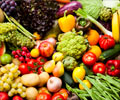
"Our vision is to give city dwellers access to agricultural goods produced in a sustainable way," said Nicolas Leschke, who founded ECF two years ago with a business partner.
Aquaponics, as the method is known, combines the techniques of hydroponics, or cultivating plants in water, with aquaculture -- or the rearing of fish in tanks.
Because it allows food to be produced directly in cities, not the distant countryside, "the environmental and financial costs of conserving and transporting the goods are greatly reduced", Leschke told AFP.
"And last but not least, it guarantees access to fresh products," he added, snacking on a home-grown swiss chard, a leafy green vegetable popular in Mediterranean cuisine.
The business has set up a prototype container farm on two levels, with a fish tank at the bottom and a small greenhouse at the top where vegetables are grown.
Advertisement
The nitrate-enriched water is then pumped to irrigate a greenhouse where the plants grow, not in soil but in a hydroponic bath of flowing water enriched with mineral nutrients.
Advertisement
Because the water is used for both the fish and the plants, the method is less water-hungry than traditional farming, while carbon dioxide in the fish waste is recycled as a plant nutrient.
- Barramundi, greens to go -
The roots of aquaponics have been traced back to the Aztecs, who raised plants on islands in lake shallows, and to Far Eastern cultures who farmed rice in paddy in combination with fish.
ECF, which last year won a start-up award in California for its innovative take on the ancient technique, has already sold several of its mini farms, but stressed that "our business is not farming as a lifestyle hobby".
The company's goal is to sell bigger farms, to companies, real estate developers or even farmers themselves, said the chief who added, "we have requests from all over the world".
For now, ECF has bought a plot of land just outside its offices where it plans to set up its first large-sized aquaponics farm next year, on a 1,800-square-metre (0.4-acre) area.
Berlin's state investment bank has agreed to help finance the venture, which the firm hopes will spin a yearly revenue of 550,000 euros ($760,000).
The farm will sell fruit and vegetables in a dedicated store on the premises, as well as deliver to Berliners who subscribe to a weekly basket of fresh produce.
It will also sell barramundi, its chosen breed of fish which is popular in Australia and Asia, "to restaurants, or if someone calls up and says 'I am having a big barbecue at the weekend, I need 10 of them'".
With its products grown next door, ECF is embracing a powerful social trend.
For more and more consumers, knowing something has been grown or reared locally is now more important than it being organic, a study by consulting firm ATKearney in Germany, Switzerland and Austria found last year.
Quality, freshness and supporting the local economy are the main reasons behind the enthusiasm for local and regional products, ATKearney said, calling the trend "the new organic".
Source-AFP












